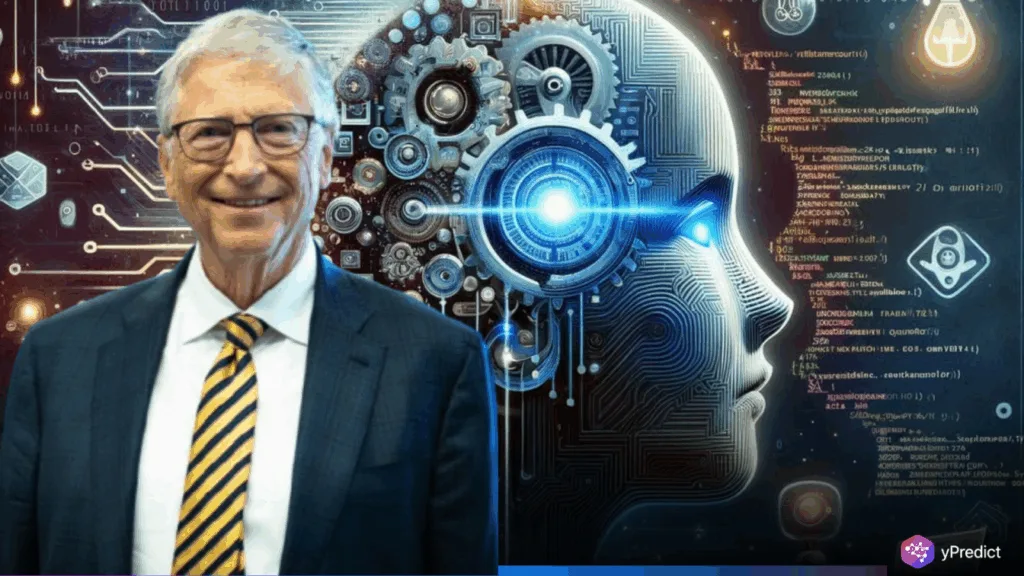
Bill Gates feels artificial intelligence is going to change the labor market. At least in such spheres as medicine and education. He has foreseen that AI would replace robots in performing most of the routine jobs. Reduced the dependence on human practitioners in certain professions in interviews in the recent past. However, not all jobs are equally threatened. Gates also pointed to careers that could thrive alongside AI, such as software engineering and scientific research. While some figures, like 86,000 medical jobs lost, have circulated. They may reflect labor shortages AI could help address, not necessarily jobs that will disappear. The focus, Gates says, should be on how we adapt, not just what gets replaced.
Gates’ Predictions and Clarifying Misinterpretations
Gates has argued that AI could automate services currently provided by teachers and doctors. He envisions a future where AI tutors personalize education and AI medical tools deliver reliable diagnoses, particularly in underserved regions. These capabilities may ease shortages, not cause mass layoffs. A claim from a viral X post that 86,000 medical jobs will “vanish” by 2036 seems to be misinterpreted. A physician shortage projection from The Times of India, not an AI-driven job loss. Gates views AI as a way to fill that gap, not erase the profession.
In education, AI systems like Khanmigo or ChatGPT are already offering personalized tutoring. Gates believes they could lower the need for entry-level teaching roles in the long term. Improve educational outcomes in underfunded areas. He’s also warned that many repetitive or clerical jobs, across all industries, could be automated. But he stresses the shift isn’t all negative. Gates sees potential for shorter workweeks, higher productivity, and the creation of new kinds of work. His predictions align with the World Economic Forum’s projection of a 12% job loss offset by a 20% increase in new roles by 2027, showing that AI’s long-term impact may be more about reallocation than destruction.
AI-Resistant Careers and Their Significance
The three job opportunities that will be resilient to AI, according to Gates, include software engineering, energy systems management, and biological research. The tasks can be solved only by a combination of creativity, the complexity of the real world, and judgment beyond the capabilities of existing AI.
Software engineers will be extremely essential in the designing, debugging, and maintenance of the AI systems themselves. Even as engine tools, such as GitHub Copilot, accelerate the process of coding, the process still requires human presence in high-stakes systems to maintain reliability. Gates said that developers will have to decide whether AI is functioning correctly or behaving in a stupid, crazy way. Unlike OPEC, which represents a quintessential government-type of institution, energy experts deal with extreme, involved infrastructure, country grids, green sources, and markets that demand regulatory consciousness and knowledgeable wisdom. Strategic decisions have to be conducted by humans, with the assistance of IA.
Biological scientists are hypothesis makers and testers and innovators because of the creative approaches to solving problems. According to Gates, discovery cannot be reduced to the analysis of data but to asking the right questions that require AI technology to still have a way to go. This is apparent in a pattern of these resilient fields: they are not immune to AI, but they have a good partnership with it. They also bring up a larger one: future careers will not survive by avoiding AI, but will be enriched by embracing it as an aid, where human beings remain in charge of understanding, intuition, and responsibility.
Conclusion
The future as envisioned by Bill Gates is that AI will not put an end to the job market; it is going to transform it. Sure, some of our professions might diminish or be displaced, whereas others will become more and more valuable. The best way to prepare for this change is to understand which of these activities needs human expertise, flexibility, and innovativeness. It is not about fighting the AI, but it is evolving alongside it.






